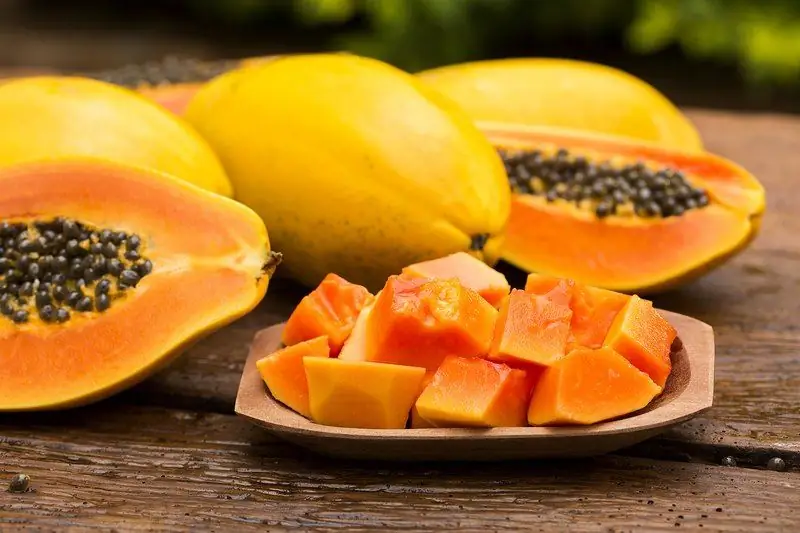
Table of contents:
- Author Bailey Albertson albertson@usefultipsdiy.com.
- Public 2023-12-17 12:53.
- Last modified 2025-01-23 12:41.
The benefits and harms of papaya for the body: will the fruit help you lose weight?
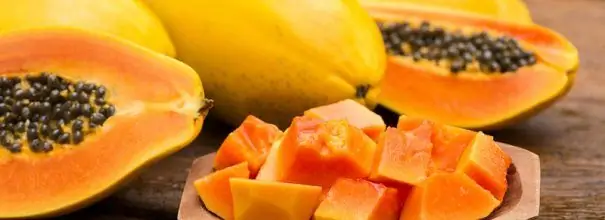
Unlike most exotic fruits for our country, papaya is considered an agricultural crop, not a wild one. In India, Thailand and other tropical countries it is grown, like Russian farmers, potatoes or apples. Why is this fruit so attractive and whether it is worth introducing it into the diet, let's try to figure it out.
Content
-
1 What is papaya
- 1.1 The benefits of papaya for the human body
- 1.2 Video: Elena Malysheva on the benefits and storage of papaya
- 2 When eating papaya is undesirable
- 3 Reviews about eating papaya
What is papaya
People are still undecided whether papaya belongs to vegetables or fruits. According to the classification of plants, it is closer to the cruciferous genus, like the white cabbage we are used to, but it grows on trees. Residents of Thailand pay attention to the degree of fruit ripeness:
- hard papaya with a greenish skin is used as a vegetable in soups, salads and meat dishes;
- papaya with juicy pulp is eaten like fruit - cut into pieces or make syrups from it, which can then be added to cocktails with and without alcohol.
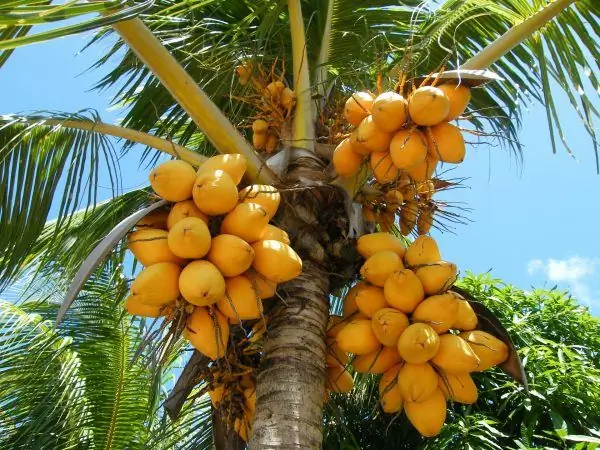
Papaya trees are male and female, only the latter bear fruit, and the former are needed for pollination
Papaya is grown all year round, so you can always find it in Russian stores. Ripe fruit can weigh up to three kilograms, but most often there are fruits of 400-800 grams. The color of the peel turns from dark green to bright yellow as it ripens. The berry pulp is orange with a reddish tinge, like a pumpkin, taste and looks like a melon or boiled carrot.
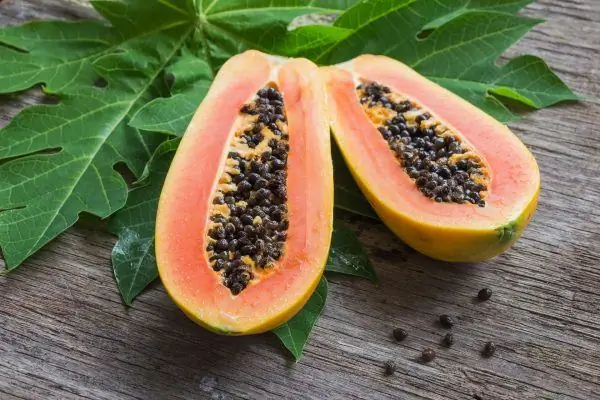
Black papaya seeds are often thrown away, although some peoples use them as a spice or as an antiparasitic agent.
The benefits of papaya for the human body
Papaya contains:
- vitamins of group B, A, C, E, D;
- iron;
- calcium;
- phosphorus;
- potassium;
- proteins;
- carbohydrates;
- cellulose;
- zinc;
- glucose;
- fructose;
-
enzymes - albumin, arginine, carpain, fibrin and papain.

Slices of papaya are on the table The papaya fruit on average contains more than half the daily value of vitamin A, which makes human skin elastic
These substances act on the human body as follows:
- excess acid in the stomach is neutralized, which is useful in diseases of the gastrointestinal tract caused by high acidity - heartburn or gastritis;
-
thanks to papain, proteins, carbohydrates and fats in the stomach are more easily broken down. This ability is useful for people whose body partially or completely does not absorb protein and therefore lack protein. Other health benefits of papain:
- thins the blood - when interacting with fibrin;
- strengthens the immune defense;
- facilitates the process of digestion of food;
- removes toxins, toxins and bad cholesterol;
- The extract obtained from papaya leaves stimulates the breakdown of fats like pepsin, which is used in various weight loss programs. Low calorie content - 48 kcal per 100 g of product - makes papaya suitable for dietary nutrition;
- eating papaya improves insulin production, which is beneficial for diabetes, especially type 1;
-
cell renewal is accelerated, so wounds and burns heal faster.

Meat cutlets and papaya ball garnish on a plate The ability of papaya to soften tough meat is used in the preparation of meat dishes, and the fruit can also be served as a side dish to difficult-to-digest foods
In the form of candied fruits, papaya retains its beneficial properties, but the calorie content of the product rises to 327 kcal, so it cannot be called dietary. If necessary, you can eat dried papaya, which contains less sugar than candied fruits.
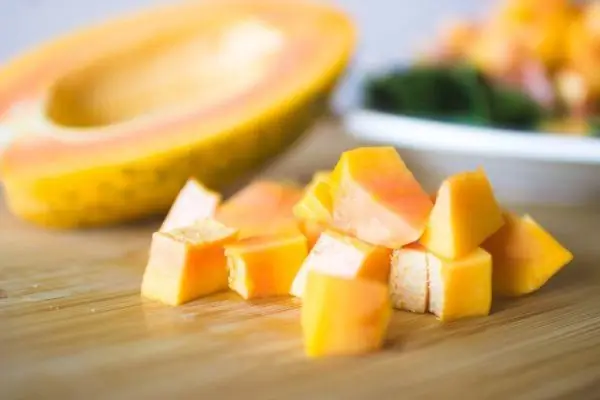
Candied fruits are pieces of fruit boiled in sugar syrup, and dried fruits are naturally or industrially dried fruits of plants
Arginine has a beneficial effect on the male reproductive system

Eating papaya by a man increases potency and has a beneficial effect on the quality and quantity of sperm
For women, papaya helps to normalize the menstrual cycle. Phytosteroids act like estrogens. Fruit pulp masks whiten skin, unclog pores and exfoliate dead skin particles. This is facilitated by the content of vitamins A, E, C and their antioxidant properties. When planning a pregnancy, papaya is useful because it contains vitamin B9 - folic acid. Lack of this vitamin can negatively affect the development of the nervous system of the unborn baby.
Video: Elena Malysheva on the benefits and storage of papaya
When eating papaya is undesirable
Harmful papaya happens when the fruit is not ripe. The juice of an unripe fruit - latex - is conventionally poisonous, the white color makes it look like milk. Latex is one of the most famous allergens. When ripe, papaya juice becomes clear and more useful.
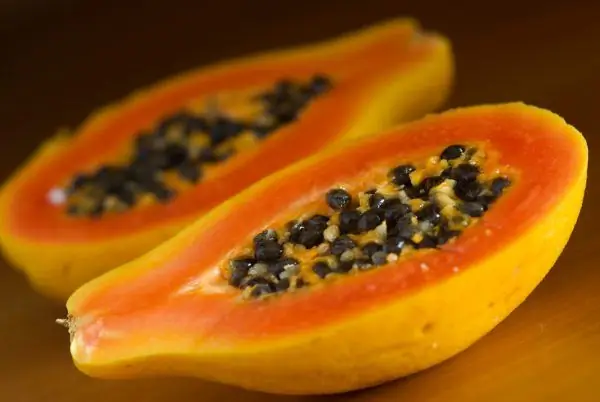
In ripe papaya, the juice soaking in the pulp becomes transparent
Anything useful in excess becomes harmful. Doctors advise against eating papaya or limiting its presence in the diet:
- with individual intolerance to the fruit. The alkaloid carpain in papaya fruits and leaves can cause poisoning of the body even in people who are not prone to allergic reactions. For our latitudes, papaya is considered exotic, it is impossible to predict its perception by a person;
- during pregnancy. There is a version that eating unripe papaya may result in miscarriage or premature birth due to lactic acid (latex), which causes muscle contractions. Controversial statement, not all gynecologists consider papaya a forbidden fruit. It is better for expectant mothers not to eat raw papaya because of the risk of poisoning;
- with diabetes mellitus. Despite the positive effects on insulin production, papaya is high in fructose. Therefore, it is recommended to reduce the consumption of this fruit, and do not eat candied fruits at all;
- when using drugs and before surgery. The interactions between drugs and papaya are poorly understood, but you should definitely not combine the intake of sugar-lowering and blood-thinning drugs with the use of an exotic fruit;
- with acute digestive disorders. Papaya should not be eaten for diarrhea, so that the dietary fiber of the fruit does not further relax the intestines.
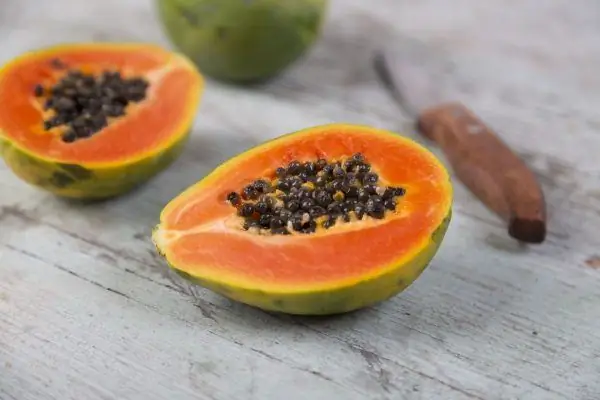
Fruits with green spots on the skin should be heat treated, even if they look ripe inside, because the carpain in papaya juice can cause poisoning
When asked how much papaya can be eaten per day without causing harm to health, only a doctor will answer. It is usually advised to limit yourself to 100 grams of fruit per day.
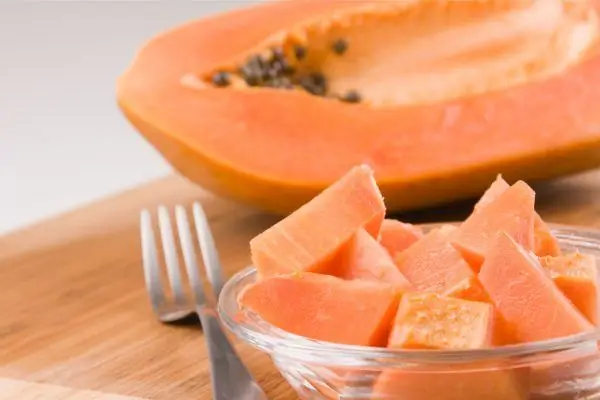
An ordinary glass can hold up to 140 g of papaya pieces, this amount is enough even in the absence of contraindications
Pediatricians advise to introduce exotic papaya into the diet of children after the baby has tried all the local fruits and vegetables - by about a year. Start with half a spoonful of very soft (ripe) papaya puree.
Reviews of the use of papaya
I ate papaya bought at a local store and brought by my sister from Thailand. I didn't notice much difference, and I don't really like the taste. However, papaya pulp skin masks do refresh the face. At least this effect has been tested on myself.
Exotic fruits have many beneficial properties, but in our latitudes they can cause an allergic reaction. Sometimes you can allow a piece of papaya to be eaten without overusing it.
Recommended:
Jerusalem Artichoke: Benefits And Harms To The Body, Including Syrup, For Diabetes, Reviews

Useful properties of Jerusalem artichoke. What diseases it helps. What parts are used for medicinal purposes. Permissible doses of Jerusalem artichoke per day. Harm and reviews
Dates: The Benefits And Harms For The Body Of Women And Men Of Dried Fruits And Compote From Them, Reviews

Dates: benefits, harm, contraindications, calories. Consumer reviews and doctors' opinions
Pumpkin: Benefits And Harms To The Body, Including Seeds, Oils, For Men And Women, Reviews

Why is pumpkin useful? What effect does pumpkin pulp, its seeds, juice have on the body? How much pumpkin can be for adults and children. Pumpkin harm and contraindications
Dried Apricots: Benefits And Harms For The Body Of Women And Men, Reviews
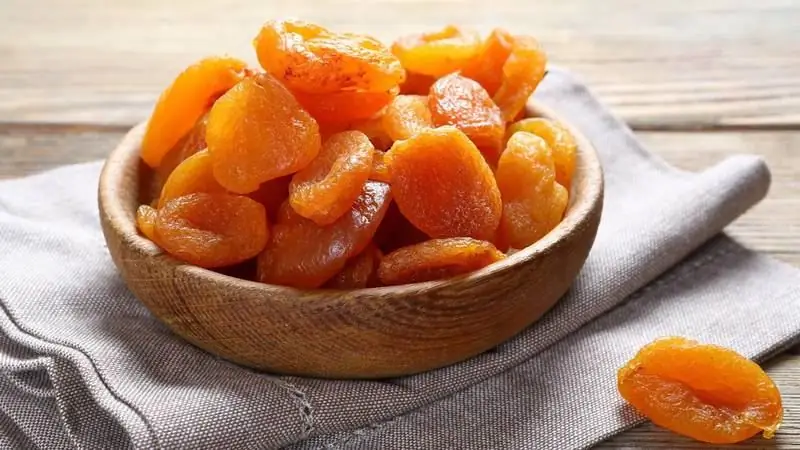
Dried apricots: nutritional value, useful elements, possible harm. How much dried apricots can you eat per day
Kefir At Night - The Benefits And Harms For The Body Of Women And Men

Kefir at night: benefits and harms. How to drink a drink correctly. Expert opinion and feedback
